When to Feed Baby: Why Start Solids at 4 to 6 Months
If you search online for when to feed babies solids, there is a lot of talk about delaying solids past 6 months and even over a year.
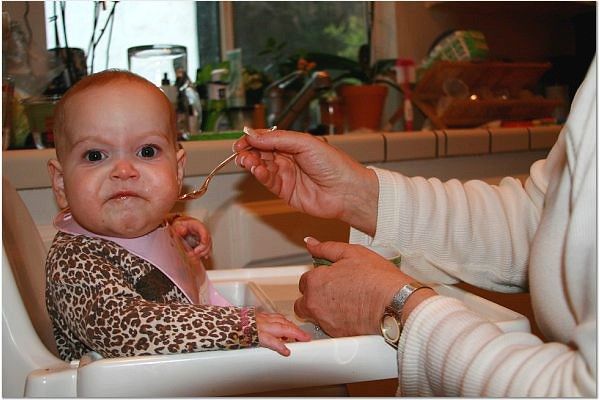
If you search online for when to feed babies solids, there is a lot of talk about delaying solids past 6 months and even over a year.
Many people say that solids should be delayed until after 6 or even 12 months because baby’s gut is not sealed, and eating solid food prior to one year can cause allergies. Research by the Committee of Nutrition and Allergy and Immunology found in 2008 that there is no concrete evidence that delaying solids after 6 months better prevents the development of food allergies.

In addition, babies need supplemental iron and zinc when they reach the age of 4-6 months. These nutrient needs can not be met by breast milk alone.
Please note: I am not suggesting that anyone stop breastfeeding. I am a strong advocate of extended breastfeeding. I am merely suggesting supplementation with nutrient dense foods.
Why You Should Start Solids at 4 to 6 Months
Sally Fallon Morell, author of Nourishing Traditions and President of the Weston A. Price Foundation writes:
No primitive culture does exclusive breastfeeding past six months. The problem with delaying solids is lack of iron, and probably choline, both needed for baby’s developing brain.
A lot depends on the maturity of the baby, of course, but if baby gets good quality breast milk or the homemade formula, he or she will be ready by six months, sometimes sooner. Of course you need to introduce food carefully… and no grains until at least one year, and even better two years.
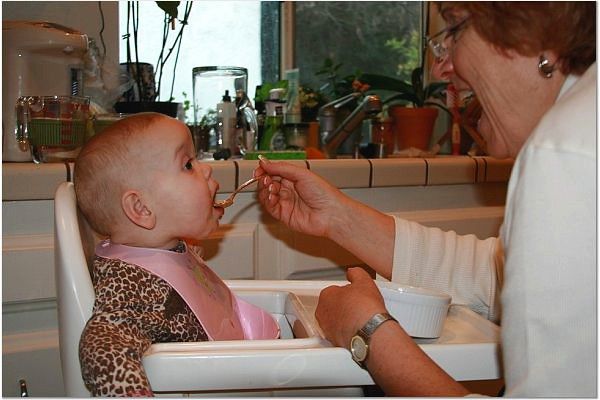

The Nutrients Babies Need At 4 to 6 Months
Babies should be breastfed from birth and for a minimum of 6 months, but ideally at least a year. The mother should eat an excellent diet to ensure that the breast milk is of the highest quality (see the diet for pregnant and nursing mothers here.)
If the mother cannot breastfed, the only formula that is adequate is the raw milk baby formula advocated by the Weston A. Price Foundation. Don’t kid yourself that commercial formulas are good for growing babies. They are full of industrial waste and should be avoided at all costs.
Read more about how to make homemade baby formula here.
Around the age of 4 to 6 months, supplementation from solid foods is necessary, as breast milk does not contain specific nutrients that are needed by the baby by the time he reaches 4-6 months old.
Iron
For healthy full-term infants, iron stores are well maintained up until 4-6 months when the iron stores begin to deplete. By about 4-6 months of age, you should start to introduce your infant to baby foods that contain iron.
Iron is a necessary mineral for body function and good health. Every red blood cell in the body contains iron in its hemoglobin, the pigment that carries oxygen to the tissues from the lungs. But a lack of iron in the blood can lead to iron-deficiency anemia, which is a very common nutritional deficiency in children. (Source)
The best choices for iron-rich first foods include liver, egg yolks and cod liver oil.
Zinc
“Breast milk provides sufficient zinc (2 mg/day) for the first 4-6 months of life but does not provide recommended amounts of zinc for infants aged 7-12 months, who need 3 mg/day. In addition to breast milk, infants aged 7-12 months should consume age-appropriate foods… containing zinc. Zinc supplementation has improved the growth rate in some children who demonstrate mild-to-moderate growth failure and who have a zinc deficiency.” (Source)
Again, liver and egg yolks are excellent first foods as they are rich in zinc.
What to Feed Your Baby at 4 to 6 Months
Cod Liver Oil, Liver and Egg Yolks
Traditional cultures fed their babies very nutrient-dense first foods. Cod liver oil, liver and egg yolks are the very best choices because they are rich in fat soluble activators A, D and K2, plus cholesterol, iron, zinc and choline. They are also foods that are very easy to digest.
Cholesterol is vital for the insulation of the nerves in the brain and the entire central nervous system. It helps with fat digestion by increasing the formation of bile acids and is necessary for the production of many hormones. Since the brain is so dependent on cholesterol, it is especially vital during this time when brain growth is in hyper-speed.
A study published in the June 2002 issue of the American Journal of Clinical Nutrition compared the nutritional effects of feeding weaning infants 6-12 months of age regular egg yolks, enriched egg yolks, and an otherwise normal diet. The researchers found that both breastfed and formula-fed infants who consumed the egg yolks had improved iron levels when compared with the infants who did not. In addition, those infants who got the egg yolks enriched with extra fatty acids had 30 percent to 40 percent greater DHA levels than those fed regular egg yolks. (Source: Nourishing a Growing Baby)
If your baby doesn’t react well to egg yolk, wait and try again in a month. Most babies can digest yolks; it is the whites that are most likely to be allergenic. (You may also want to check to see if your farmer is adding soy to the feed. If you can find soy-free pastured eggs, you may find that your baby does not react.)
More Foods to Introduce
After your baby is consuming cod liver oil, liver, egg yolks and cod liver oil, you can try introducing the following foods as baby begins to show readiness and interest:
Bone broth – homemade chicken stock or beef stock
Naturally fermented foods – kefir, yogurt, sauerkraut, pickles (we’re talking about foods fermented in salt and/or whey, not made with vinegar)
Healthy fats – grass-fed butter, cream, tallow, lard and coconut oil
Grass-fed meats – ground up, pureed or pre-chewed
Cooked fruits and vegetables – should always be cooked in and/or served with good fats
Foods to Avoid
Baby foods that come in a jar
Grains – it is best to wait 1-2 years to feed babies grains, as they do not have the enzymes to digest them
Honey – babies should not get honey prior to one year
Soy – even properly fermented soy is not easy to digest
Nuts and seeds – wait until baby is over a year, and then always soak and/or sprout
Grapes and other small foods that pose a choking hazard
Raw fruits and vegetables – these are hard to digest and should always be cooked or fermented (with the exception of banana and avocado)
It is best to introduce foods one at a time, waiting at least a few days to a week in between new foods.
Please read this article for more details on how and when to introduce solid foods to your baby: Nourishing a Growing Baby
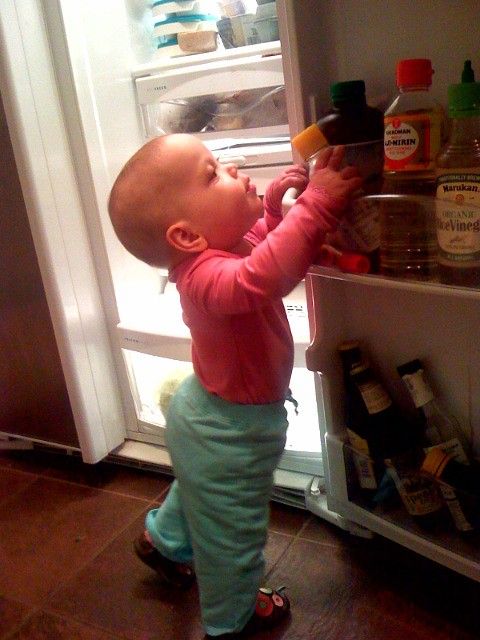
Our Experience with Feeding Solids
I started Kate on solid food at around 5 months: egg yolks and liver. She got cod liver oil at 4 months old.
No jars of baby food and no rice cereal for her! I followed the recommendations of the Weston A. Price Foundation. I found this article to be extremely helpful: Nourishing a Growing Baby.
Every morning Kate got egg yolk, warmed but still runny, with freshly grated, frozen calves liver (organic and grass-fed) and a pinch of sea salt.
She often got chicken or duck livers and/or hearts (organic and pastured) for lunch or dinner. I’d saute them in grass-fed butter, duck fat, or coconut oil and she would devour them.
She ate liver pretty much every single day until she was over a year old, at which point I’d give it to her 1-3 times per week. Sadly, she started rejecting liver when she was about 3 1/2. I’m still working on getting her back into loving liver. (I’ll be trying foie gras next.)
Here she is on her first birthday:
Instead of cake, I gave her a slab of duck liver pate, which she loved.
In addition to liver and egg yolks, when she was 6 months old, I fed her ground grass-fed meats and bone broth (homemade chicken stock or beef stock). I also gave her lots of grass-fed dairy: butter, cream, cheese, sour cream, yogurt, and kefir.
She also loved homemade sauerkraut and naturally fermented pickles. I also fed her fruits cooked in butter or coconut oil and often served with raw cream or yogurt, and some cooked vegetables cooked in butter or coconut oil or duck fat. I never gave her raw vegetables as they are too hard to digest, and the only raw fruits she got were bananas and avocado. (The pectin in apples, berries and other fruits makes them too hard to digest.)
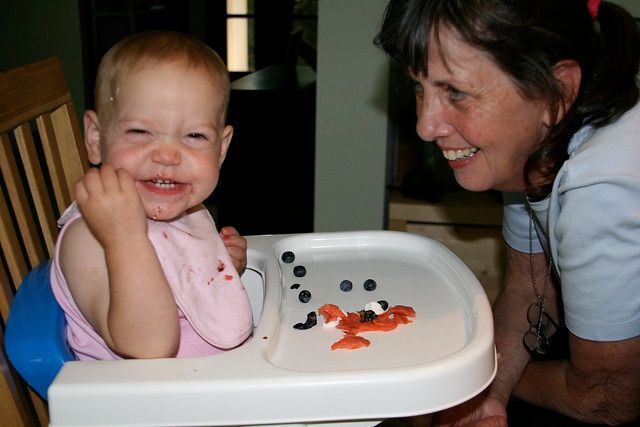
After a year, I introduced whole eggs and her typical breakfast because scrambled eggs cooked in butter or coconut oil with grated liver. At that time I also introduced seafood.
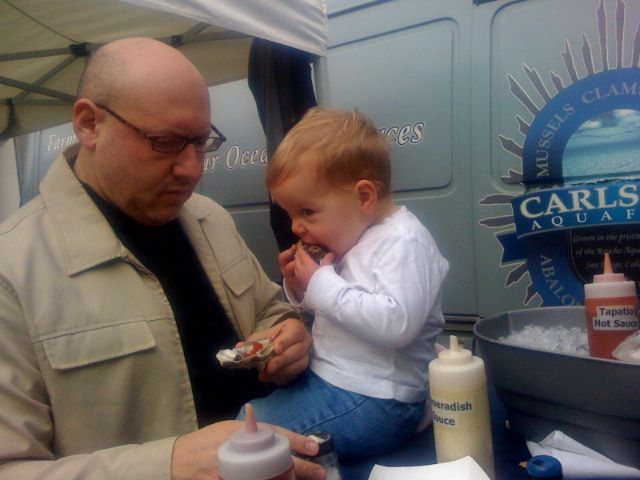
She used to love wild smoked salmon and oysters. She actually ate a dozen raw oysters one time. Nowadays, she doesn’t eat raw oysters but she does love lobster, clams, crab, mussels and shrimp.
I did not feed Kate any grains until she was 18 months old. I fed her soaked/sprouted whole grains in moderation. She also did not get sweets until she was over a year old (other than fruit), and then I kept it to unrefined sweeteners like maple syrup and honey, again, in moderation.
Since I was not able to breastfeed past 9 months, I also continued with the raw milk baby formula until she was almost 2 years old, at which point I switched to whole raw milk.
Where to Find Cod Liver Oil
Not all cod liver oil is the same. I don’t recommend buying it in a store. Store-bought cod liver oils are all heated and refined, and usually they have added synthetic vitamins. Read my blog post about which cod liver oil I recommend and why.
Avoid fermented cod liver oil, due to concerns of rancidity. See my posts about the fermented cod liver oil scandal.
Read More About How to Feed Babies
Feeding Babies on the Weston A. Price Foundation website
Nourishing a Growing Baby
Tricks of the Infant Food Industry
Including Baby at the Family Table
Share Your Thoughts Below
What do you think? When did you start feeding your baby solids?



Comments ()